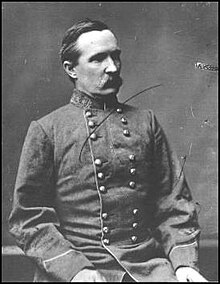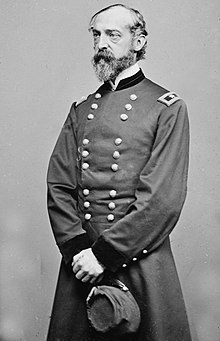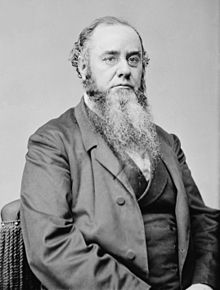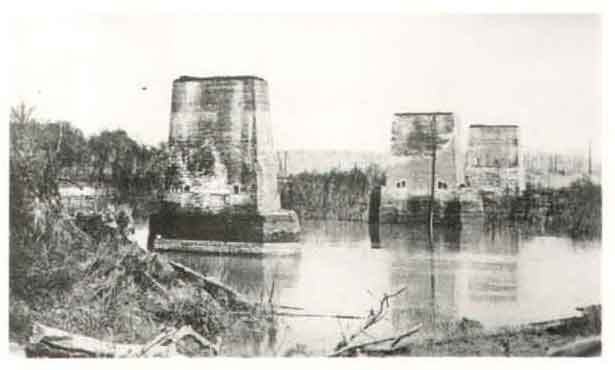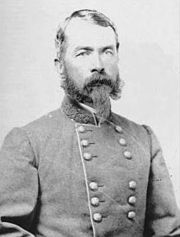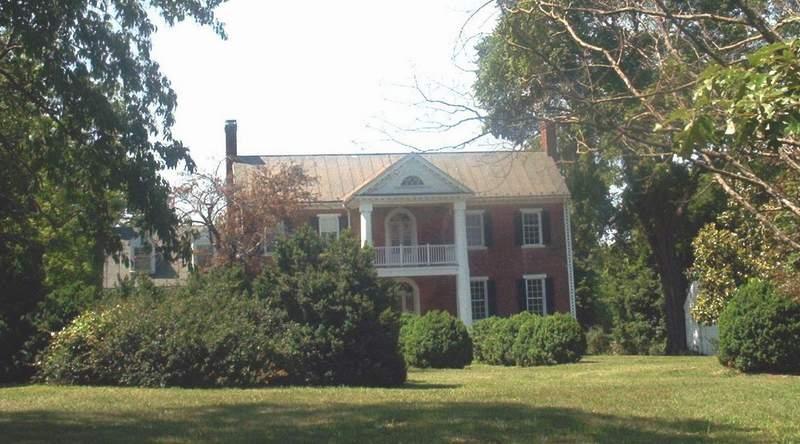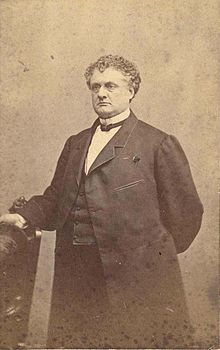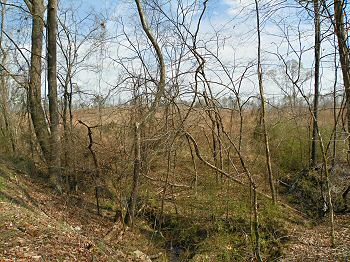 |
| CSA Left Flank (1 mile in front of Champion Hill) CivilWarAlbum.com |
BOLTON, MISS.,
May 16, 1863
Brigadier General A. J. SMITH.
GENERAL: I have the honor to acknowledge the receipt of your note to
General Carr, advising him of your arrival at Raymond. Inclosed you will
find orders for the movement of your DIVISION. # If
you are prompt in your movement, at 4 a. m. you will take the lead in
the left wing, General Blair having orders to move at 5 a. m. You will
take the road to Edwards Depot, which leaves the Raymond and Bolton road
1 1/2 miles this side of Raymond, diverging to the left.
JOHN A. McClernand.
CLINTON, MISS.,
May 16, 1863-5. 30 a. m.
Major General WILLIAM T. SHERMAN, Comdg. Fifteenth Army Corps:
Start one of your DIVISIONS on the road at once, with their ammunition
wagons, and direct the general commanding the DIVISION to move with all
possible speed until he comes up with our rear beyond Bolton. It is
important that the greatest celerity should be shown in carrying out
this movement, as I have evidence that the entire force of the enemy was
at Edwards Depot at 7 p. m. last night, and was still advancing. The
fight may, therefore, be brought on at any moment. We should have every
man in the field.
U. S. GRANT.
GENERAL ORDERS,
HDQRS. Fifteenth ARMY CORPS. Numbers 36.
Bolton, MISS.,
May 16, 1863.,
The movement to-morrow will be as follows:
I. All the effective cavalry will constitute the advance, and will move
as soon as day breaks by a road that will be explained to them by the
general commanding. All the non-effectives will be put under an officer,
and ordered to accompany the wagon-train, to protect it.
II. General Steele's DIVISION will lead and General Tuttle's follow.
Each DIVISION commander will designate a good officer to take charge of
the tired and foot-sore, to remain with the wagon train, composed of all
the wagons of this corps, which will follow the troops, and as soon as
firing is heard in the front, the wagons will be parked, and all wagon
guards will prepare to defend it.
III. The troops will march Light, followed only by ammunition wagons and ambulances, which will follow brigades.
IV. The occasion calls for the utmost energy of all the troops. One
determined effort and the opportunity for which we have all labored so
hard and patiently will not be lost. Our destination is now the Big
Black River, 13 miles distant, beyond which lies Vicksburg. The
commanding general announces that the other corps with which we are
acting have to-day signally repulsed the enemy, and our part is to make
that repulse a complete defeat.
V. The artillery of each DIVISION will be massed and kept near the front of each DIVISION.
By order of Major General W. T. Sherman:
R. M. SAWYER,
Assistant Adjutant-General.
CLINTON, MISS.,
May 16, 1863-5. 45 a. m.
Major General J. B. McPHERSON, Comdg. SEVENTEENTH Army Corps:
I have just received information that the enemy have crossed Big Black
with the entire Vicksburg force. He was at Edwards Depot last night, and
still advancing. You will, therefore, pass all trains, and move forward
to join McClernand. I have ordered your rear brigade to move at once,
and given such directions to other commanders as will secure a prompt
concentration of your forces.
U. S. GRANT.
BEFORE EDWARDS STATION,
May 16, 1863.
Brigadier General A. P. HOVEY:
GENERAL: Your dispatch is received. * I have referred the question of
bringing on an engagement to General Grant, who is said to be close by.
Osterhaus is about 4 miles from Edwards Station; Smith 5 miles, and both
have driven before them the enemy's pickets and skirmishers. Carr is
well up to Osterhaus, and so is Blair to Smith.
It appears that no force has passed to our left and rear. So soon as I
am advised by General Grant, I will communicate with you. Meantime take
any advantage you can, without bringing on a general engagement. Watch
your left as well as right. Communicate often.
JOHN A. McClernand,
*Not found.
JONES' PLANTATION,
May 16, 1863-6 a. m.
Major General U. S. GRANT, Commanding, &c:
GENERAL: I think it advisable for you to come forward to the front as soon as you can.
Very respectfully, your obedient servant,
JAS. B. McPHERSON,
HEADQUARTERS THIRTEENTH ARMY CORPS,
In the Field, before Edwards Station,
May 16, 1863-7. 50 a. m.
Major General J. B. McPherson, Comdg. SEVENTEENTH Army Corps:
GENERAL: My artillery has engaged the enemy on my extreme left. I am, as
I advised you this morning, convinced that if you will move on the far
side of the railroad and fall on the enemy's flank and rear, it would be
decisive; besides, Hovey may need support by a co-operative movement by
you, either on the north or south side of the railroad.
Respectfully, your obedient servant,
JOHN A. McClernand.
IN THE FIELD, Before Edwards Station,
May 16, 1863.
Brigadier General A. P. HOVEY:
GENERAL: Our forces have engaged the enemy with artillery on the left. Move forward on the right, cautiously but promptly
Very respectfully,
JOHN A. McClernand.
ONE AND A HALF MILES FROM BAKER'S CREEK,
May 16, 1863.
Major General U. S. GRANT, Commanding Department:
GENERAL: I received an order last evening from General McClernand to
take the road from Raymond to Edwards Depot, which I accordingly did,
and am now, at 9. 50 a. m., within 1 1/2 miles of Baker's Creek. General
A. J. Smith's DIVISION is with me. We are feeling the enemy cautiously,
skirmishing, and I have sent to ascertain the exact where-abouts of
Osterhaus, Carr, and Hovey. We shall attack as soon as we can develop
the enemy's position and ascertain that of our friends.
Respectfully, &c.,
FRANK P. BLAIR, Jr.
CLINTON, MISS.,
May 16, 1863.
Major General F. P. BLAIR, Jr.:
Commanding FIFTH DIVISION, Fifteenth Army Corps:
Information received indicates that the enemy have moved out to Edwards
Station, and are still pushing on to attack us with all their force.
Push your troops on in that direction as rapidly as possible. If you are
already on the Bolton road, continue so; but if you still have a choice
of roads, take the one leading to Edwards Depot.
Pass your troops to the front of your train, except a rear guard, and
keep the ammunition wagons in front of all the others. I sent your
orders on the 14th to move directly from wherever you might be to
Bolton. Did you received the order? If you take the Edwards Depot road,
you will want to communicate with the troops along the railroad by all
cross-roads, after having advanced to WEST of Bolton. Precautions in
approaching Baker's Creek are necessary. Before doing so, know where
friend and enemy both are.
U. S. GRAN
BEFORE EDWARDS STATION, MISS,
May 16, 1863.
Major General U. S. GRANT, Comdg. Dept. of the Tennessee:
GENERAL: At 9. 45 a. m. General Hovey has advanced on his road about 4
miles. Finds the enemy strongly posted in his front, showing two pieces
of artillery at the distance of some 400 yards. The general has taken 15
prisoners, who represent the enemy to be from 50,000 to 60,000 strong.
Osterhaus must be some 4 miles from Edwards Station. General Smith is
about the same distance.
McPherson, I think should move up to the support of Hovey, who thinks
his right flank will encounter severe resistance. Shall I hold,
EDWARDS STATION, MISS,
May 16, 1863. -12. 35 p. m.
Major General John A. McClernand, Comdg. Thirteenth Army Corps:
As soon as your command is all in hand, throw forward skirmishers and
feel the enemy, and attack him in force if an opportunity occurs. I am
with Hovey and McPherson,. and will see that they fully co-operate.
or bring on an engagement? General Hovey thinks the enemy has passed a
large force toward Raymond, and to our rear, but an aide from General
Smith knows nothing of it.
JOHN A. McClernand.
U. S. GRANT.
IN THE FIELD, Before Edwards Station,
May 16, 1863.
Generals Smith and Osterhaus will attack the enemy vigorously, and press
for victory. Generals Carr and Blair will support Generals Smith and
Osterhaus. General Carr will place General Lawler's brigade as a reserve
in front of his first position to-day.
By order of Major General John A. McClernand:
A. L. LEE.
HEADQUARTERS THIRTEENTH ARMY CORPS,
May 16, 1863.
General OSTERHAUS:
We are informed that a force of infantry and artillery are pressing
between you and Smith. We threw Blair's right and Carr's left between
the road. Look out for the enemy there.
By order of Major General John A. McClernand:
A. L. LEE.
HEADQUARTERS THIRTEENTH ARMY CORPS.
In the Field,
May 16, 1863.
General CARR:
Information is received that the enemy are pressing infantry and
artillery between Smith and Osterhaus. You will throw a brigade on the
left of your road, and advance it to oppose any such attempt. General
Blair will also throw a brigade from his right for the same purpose.
Whenever your brigade commander is satisfied that no danger is to be apprehended from that quarter, he will resume his position.
By order of Major General John A. McClernand:
A. L. LEE.
Official Records, Series I., Vol. 24, Part 3, Pages 316-320.
Johnston left Jackson when Grant moved between the Vicksburg and Jackson forces. Pemberton was ordered to leave Edwards Depot and attack the Union forces at Clinton. Pemberton at first advised against the order, but then turned to move on Clinton, which placed his supply wagons in the vanguard. Pemberton drew up his forces on a commanding ridge overlooking Jackson Creek. Three Union columns moving up the Jackson Road threatened the Confederate left at Champion Hill. If this position was turned, the rebels would be cut off from their line of retreat. For five hours a series of attacks and counterattacks ensued, before the Southern forces fell back behind the Big Black River in front of Vicksburg. It was ultimately a victory for Grant, both in terms of casualties (3,000 CSA, 2,500 US) and position (moving the rebels back further toward Vicksburg).




